27 December 2012--Fear of Banks
A new policy paper from the World Bank states that one of the barriers to economic activity and development in Cambodia is the fact that more than 95% of the adults do not have a bank account. The adults were alive when the Khmer Rouge abolished money and confiscated everything and they're not quite ready to trust a bank with their money again. Also the banks are not always that trustworthy. In 2000 when I came to Cambodia, the capitalization needed to start a bank was $4 million! That's floor sweepings in a modern international bank. About five years ago that amount was raised to $13 million and thirteen banks closed because they couldn't raise that much money. Now the capitalization required is about $30 million. Even businesses in Cambodia generally do not have bank accounts.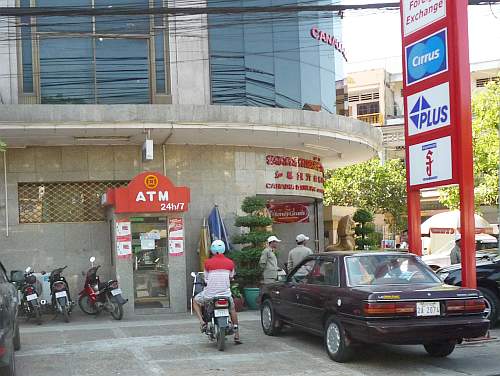
21 November 2012--Obama and Cambodia
President Obama left Cambodia yesterday evening. The commuters of Phnom Penh probably gave a sign of relief. Traffic in Phnom Penh is normally illogically chaotic and with many major streets repeatedly blocked, it became an even worse nightmare. Some of the DDP staff talked of a 25-minute normal ride home becoming a 4-hour commute. Prime Minister Hun Sen probably breathed a sigh of relief also. His problems won't clear up as quickly as the traffic will recover, though. In fact they will linger for a while as Cambodia damaged its reputation and exhibited dictatorial tendencies once again. Another ASEAN meeting several months ago ended without a final statement because Cambodia blocked the issue of territorial rights in the South China Sea from being discussed--at China's request. The same row erupted again at this week's meeting. And when President Obama spoke about some of Cambodia's failings towards its people, the government here immediately responded that he was misinformed--which anyone who reads the papers knows is not true. And then when Obama and Hun Sen started their meeting, the press corps were abruptly and unceremoniously forced out of the meeting room. Old habits--and old paranoias--linger on, and continue to give a bad name to Cambodia in international diplomatic circles.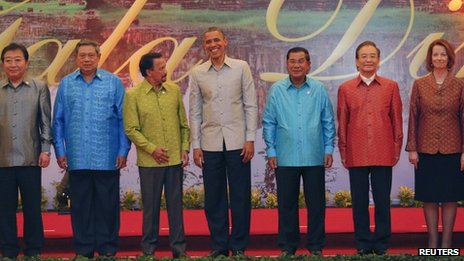
2012--Not all ready for the 21st century
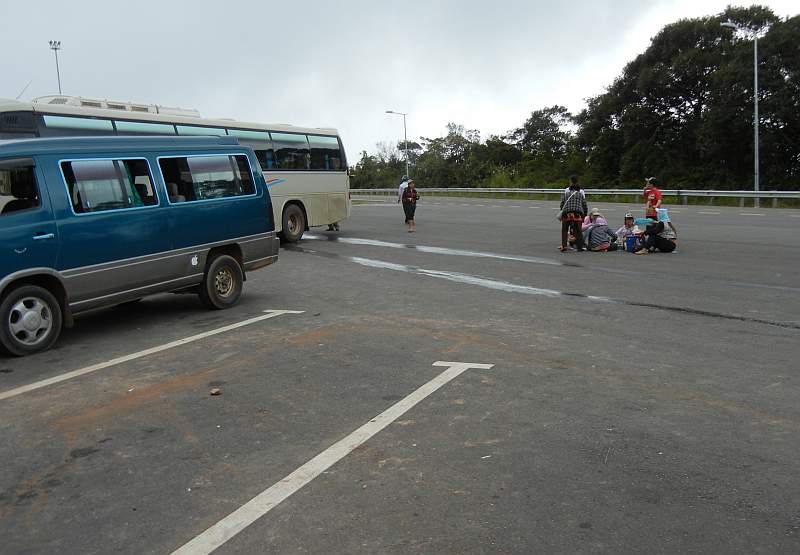
An average of five people die every day in traffic in Cambodia. One reason is that culturally many of the people don't know how to live in a city with traffic. They grew up in rural villages where there are only foot paths along rice paddy dikes or dirt paths through the trees—and no vehicles, and the way they walked on the paths is the way they walk now on the streets. If they are not in the middle of a street, they are in the middle of a lane. I often, on my bicycle, find myself going on the right of people walking in the lane I'm in, between them and the curb.
This is the parking lot at a shrine on Bokor Mountain in Kampot Province. It's probably the only U.S. Interstate style parking area in the country, just opened last year. Notice the people sitting not in front of the cars, on the land, but behind the cars where the traffic is moving. That doesn't strike them at all as unusual or dangerous. That's where they want to sit.
21 September 2012--More Misconduct Headlines 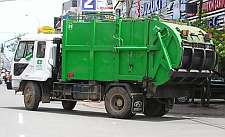
Click here to see still more headlines of official misconduct in Cambodia.
18 August 2012--City Life
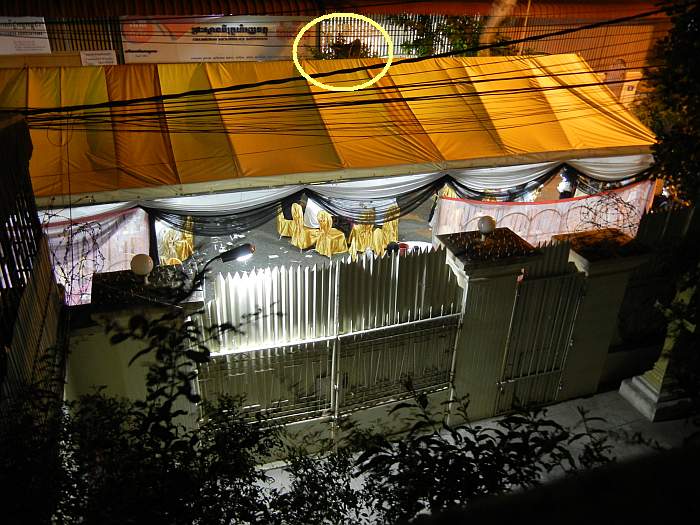
An on-going problem in Phnom Penh is that many of its residents don't know how to live in a city. 85% of the population live in rural villages without electricity, toilets, or even roads, but many of those people migrate to Phnom Penh looking for work. And they bring with them their rural ways, e.g., walking in the middle of a busy street the same way they would on a dirt path "back home."
Another problem is the celebration of weddings and funerals. In the rural areas there are no places to bring together large numbers of people so the families erect tents in the fields next to their houses for the ceremony with the monks and then serving meals to the visitors. They bring that same expectation and practice to the city, and when someone dies they set up a large tent--there are companies that specialize in this--not in a field (there aren't any) but in the street in front of their house, totally blocking the street.
This photo shows a tent in front of our house on Street 320 a few days ago. A woman across the street died and on Thursday night her family set up this tent. Often the family can only afford tents and food for one day so the next day it is removed, but this family had money--and apparently wanted to show it--so the tent and the meals and guests weren't removed until Sunday morning. In the meanwhile we could not even open our gates fully to get our truck in and out and those of us on bicycles and motorcycles threaded a way among tables and diners to get in and out of the house.
To make it all worse, a speaker BLASTS funeral music and chanting from 5:30 AM until 10:00 PM, non-stop. I mean blasts. Because there are no obituaries in the papers, news of a death or wedding in the rural areas is spread by extremely loud PA systems to alert neighbors and passersby. Of course, they bring that custom to the city also. The speaker (yellow circle) may not look big in this photo but it is the kind used in a football stadium--and it's only twenty feet from our house. The din is incredible. Many foreigners decide they can't fight this battle and just move to hotels when the locals commandeer the streets.
11 August 2012--Gender Equality Index
A group called Social Watch produces a Gender Equality Index each year which measures the equality (or lack of it) between opportunities for men and for women. For instance it will not say that men in a given country are better educated than women but rather it will measure whether men and women have equal access to education. Cambodia received a ranking of 55 points, the lowest rating in the East Asia and Pacific region, and far below the regional average of 69. The three areas that are surveyed are Empowerment, Economic Activity, and Education, and of particular concern for Cambodia is the gap between men and women in education. The report notes that Cambodia faces significant economic, social, and environmental challenges. 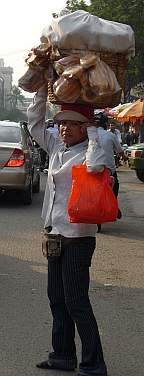
10 August 2012--Dang, and I missed the 18th ARF, too!
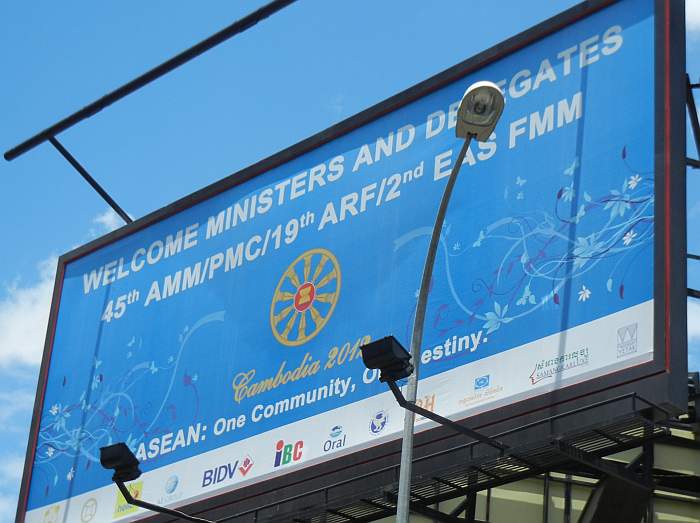
Large signs on the street, and especially billboards, are generally meant to convey a message to a significant percentage of the population. This sign--probably erected on the occasion of the ASEAN meeting in Phnom Penh—leaves something to be desired in the area of intelligibility. It may have been positioned mostly to gratify the egos of those attending the AMM/PMC, the ARF, and the EAS FMM, whatever those are, but otherwise it probably is just a good indicator of what many employers, directors, and managers decry--the lack of critical thinking among the general population. No one thought critically enough to put up a comprehensible sign, and the fact that it is incomprehensible doesn't bother anyone. (And lest I be guilty of acronymism myself: ASEAN=Association of SouthEast Asian Nations, a feckless, ineffective talking shop based on mutual non-interference.)
31 July 2012--More Misconduct Headlines 
Click here to see still more headlines of official misconduct in Cambodia.
26 July 2012--Economic Survey
The Ministry of Planning recently released a nationwide survey of Cambodian business and reports that there are 505,000 businesses in the country with a workforce of 1,676,000 men and women, about 11.5% of the population. Some interesting statistics from the census:
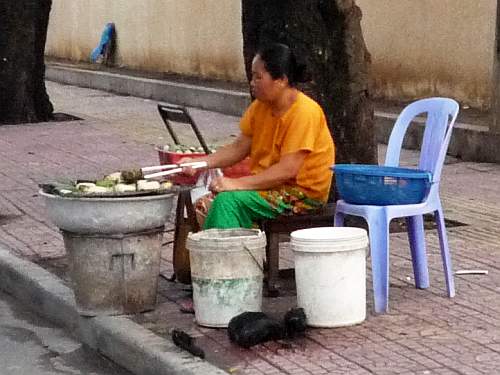
25 July 2012--More Misconduct Headlines 
Click here to see still more headlines of official misconduct in Cambodia.
8 June 2012--Child Labor
Child labor is an equal opportunity option for kids in Cambodia. No discrimination against young girls here. This is a building going up across the street from the Deaf Development Programme office. 
10 May 2012--Cambodian Stock Exchange
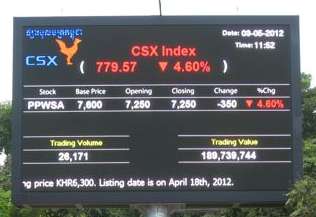
6 May 2012--More Misconduct Headlines 
Click here to see still more headlines of official misconduct in Cambodia.
19 March 2012--More Misconduct Headlines 
Click here to see still more headlines of official misconduct in Cambodia.